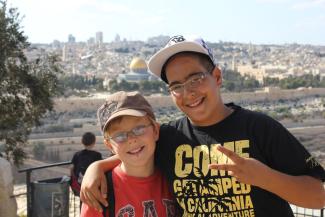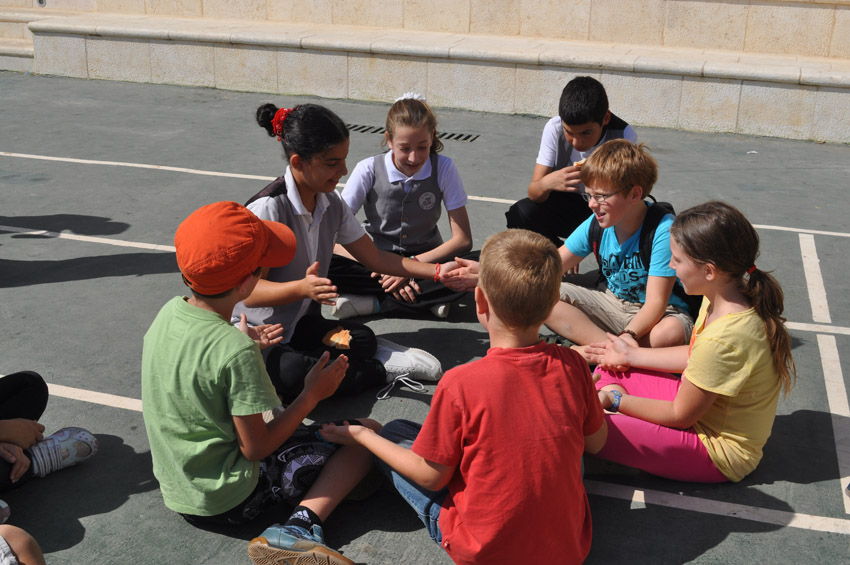Children
Partnering with a Palestinian school

Bethlehem: the name of this small Palestinian town triggers strong emotions in Germany. Christmas stories come to mind. But isn’t our pediatrician also Palestinian, and didn’t he recently tell us about border controls?
That was how I felt in 1996, when the city of Cologne decided to become Bethlehem’s twin city. At the time, great hopes marked the region. Two years earlier, Israel’s late Prime Minister Yitzhak Rabin, Foreign Minister Shimon Peres and Palestinian leader Yasser Arafat had received the Nobel Peace Prize. Back then, I was the principal of the Irisweg Primary School in Cologne and excited by the idea of establishing a partnership with a school in Bethlehem. It would be most rewarding for our pupils to be in touch with children from such a different country.
With the city’s help and the Partner City Association, which facilitates interaction between Cologne and Bethlehem, we quickly made contact. A few months later, Viola Raheb, school superintendent for the Palestinian Territories, visited our school. Her warmth, commitment and fervour inspired everyone. At the time, we had to fend off accusations of anti-Semitism, and she fast convinced the sceptics. We began to plan a partnership with the Dar Al-Kalima school in Bethlehem.
The Irisweg Primary School is a state-run school for children the ages of six to ten years old. The Dar Al-Kalima School, however, is run by the Evangelical Lutheran church. It offers education from kindergarten up to 12th grade.
In close cooperation, we defined the guiding principles of our partnership:
- We meet as equals, not as donor country on one side and developing country on the other.
- We exchange topic-related school material on country, culture, religion and daily life for our classes.
- We inform our partner school about classes, school life and important festivities.
- We use all means of communication: regular post, internet, phone, fax.
- Depending on the political situation, we will run a continuous teacher exchange programme and start student exchange as well.
The partnership agreement was officially signed on 10 October 1999. It was the first of its kind. Our cooperation has survived politically turbulent times and is still in full swing.
Whoever doesn’t appreciate hospitality
Right from the start, communication was lively and continuous. We started joint projects – on subjects like: “How do children live with a separating wall?” We linked the history of the Berlin Wall, which had divided Germany until 1989, to the wall that fences off Bethlehem. Personal encounters, however, are at the heart of any school partnership, and for a long time that was hardly possible because of political tensions (see box).
After more than 10 years of partnership, a student exchange programme finally took place in December 2010. Ten students from Bethlehem came to Germany and stayed with host families. They attended morning classes and joined social and cultural programmes in the afternoon. The experience was so wonderful that we immediately agreed on returning the visit. The German and Palestinian children had no common language, but it is amazing how well primary school children relate to one another without having such a language. They easily make friends.
The exchange project was promoted and supported by the state government of North Rhine-Westphalia. The big question, however, was: would it be possible for elementary school children to travel to the Middle East?
Many parents worried about sending their young children to such a distant place, especially as it is located in a crisis region. They came up with the brilliant idea of coming along themselves. The children would live with host families, while the adults stayed at the school’s guesthouse. In the end, it was a real student exchange – with parents nearby in case of emergencies.
We all flew to Tel Aviv on 9 December 2011: ten children, eight mothers, two teachers and me. It was the beginning of an incredible experience. Our host school was so welcoming we could have brought 50 children along. Each morning, the children took part in the lessons and in the afternoon they participated in group activities, joint excursions and family programmes.
Despite previous concerns, the children got along wonderfully. “Zain and her family were very nice to us. They gave us extra bedding and even bought a new bed for us,” wrote nine year-old Inca after the trip.
“I think, whoever doesn’t appreciate hospitality can’t be helped. My mother and I gained 20 kilos each. We had a lot of fun, laughed a lot and sang wonderful Arabic songs. I hope to see my Palestinian friend soon, so we can laugh together again.”
Some families are still in touch today and continue to visit each other. “The incredible hospitality was probably the most impressive experience for the German group,” wrote Annelie Kuhn, one of the teachers. “The fact that we came with children set us apart from other group visits, and that was considered a sign of hope.”
For the children, the trip was an unforgettable experience. They obviously became aware of political tensions. “The wall is a terrible sight,” Inca wrote. “I was very frustrated when soldiers came into the bus. Those guarding the wall carried huge machine guns and had their finger set on the trigger.” Annelie Kuhn recalls the restriction people of Bethlehem face. “Their freedom of movement is restricted. This was very obvious during our trip to Jerusalem. Apart from two mothers and their children, who had special passes, no Palestinian child could come along with us.”
Political, humane and sustainable
Some may ask why elementary school children should be confronted with such difficult issues. We discussed matters in advance with the children and then decided to do it. Children have a strong sense of justice, especially when it comes to their peers. They do not think in terms of black and white, or good and evil. They are not interested in the politics of power. They are interested in the welfare of the people around them. If one discusses the contradictions that arise from politics with them, their concerns are empathy, understanding and peace.
Our school partnership has received several awards. Through the mayor of Cologne, we received an award as School of the Future, for example. We also won the Hans-Jürgen Wischnewski Award (Wischnewski was Germany’s federal minister for economic cooperation in the 1960s) and won the competition “Cologne schools for sustainable development”. Both schools now have new principals who want the exchange programme to continue, adapting it to changing times.
School partnerships are extremely special, not only for principals, but for everyone involved: students, teachers, parents, school management et cetera. Exchange stands out from normal schooldays, creating spaces for meeting peers who live elsewhere. It opens hearts and educates. School partnerships are politically relevant, reflect humane principles and have a lasting effect.
Martin Verfürth is a retired school principal. He initiated the school partnership between the Irisweg Primary School in Cologne and the Dar Al-Kalima School in Bethlehem.
martin.verfuerth@koeln.de
Link:
Information about the school partnership:
http://grundschule-irisweg.de/CMS01/index.php?page=102







